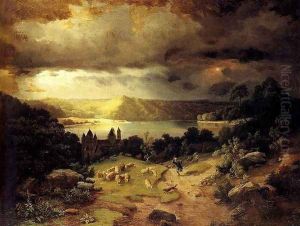Georg Otto Saal Paintings
Georg Otto Saal was a German painter, primarily known for his landscape and historical paintings, born on March 22, 1817, in Karlsruhe, Germany. He was part of the 19th-century European art movement, contributing significantly to the Romantic and Realist styles prevalent during his time. Saal's works often depicted the natural beauty of landscapes, infused with a sense of realism and emotional depth, characteristic of the Romantic movement. Additionally, his historical paintings were celebrated for their detailed accuracy and the ability to evoke the spirit of the past.
Saal received his artistic training at the Academy of Fine Arts, Karlsruhe, under the guidance of prominent teachers such as Johann Wilhelm Schirmer, who was a key figure in the German Romantic landscape painting tradition. This education laid the foundation for Saal's development as a painter and influenced his early works. Seeking further inspiration, Saal traveled extensively throughout Europe, including visits to Norway, where he was profoundly influenced by the dramatic landscapes. These travels played a crucial role in shaping his artistic vision and approach to landscape painting.
Throughout his career, Saal achieved considerable recognition for his work. He participated in numerous exhibitions, receiving accolades for his ability to capture the essence of nature and historical subjects with both accuracy and emotional depth. Despite his success, Saal remained dedicated to his artistic development, continually refining his technique and exploring new themes.
Georg Otto Saal's contribution to the art world remains significant, as his works continue to be appreciated for their beauty, historical value, and emotional depth. His paintings can be found in various museums and private collections, serving as a testament to his talent and the enduring appeal of his artistic vision. Saal's legacy is that of a painter who was able to bridge the gap between Romanticism and Realism, capturing the world's beauty and the human experience's complexity with equal skill. He passed away on July 24, 1870, in Karlsruhe, leaving behind a body of work that continues to inspire and captivate audiences.
